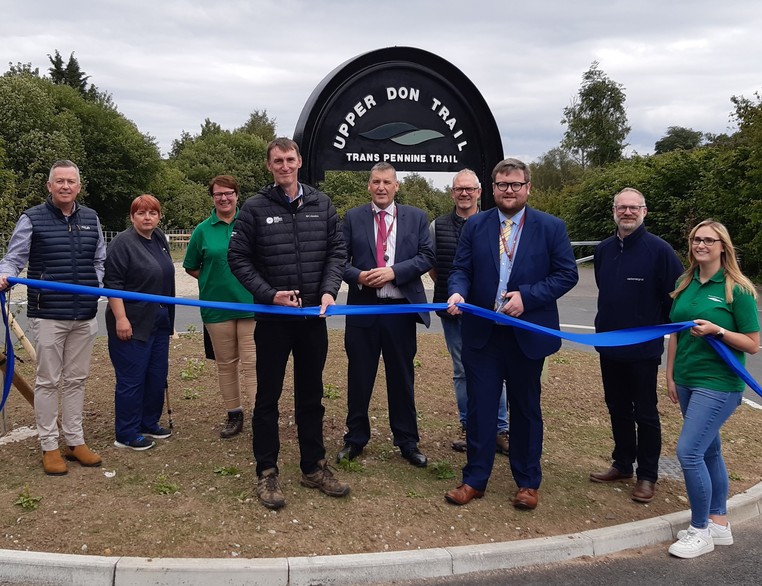

National Grid completes landscape transformation in the Peak District
- Project to remove seven pylons and 1.5km of overhead electricity line from the Dark Peak landscape successfully completed
- Senior representatives from the Peak District National Park Authority and Barnsley Metropolitan Borough Council officially open revamped car park in Dunford Bridge marking project’s final phase of the project
- Project team celebrates achieving 18 per cent biodiversity net gain with habitat enhancements along a section of the Trans Pennine Trail
National Grid’s project team is celebrating the completion of its Visual Impact Provision (VIP) project which has successfully transformed the landscape in the Peak District National Park and along a popular stretch of the Trans Pennine Trail.
Senior stakeholders from the Peak District National Park Authority and Barnsley Metropolitan Borough Council were on hand to cut the ribbon, formally re-opening the public car park in Dunford Bridge, following the completion of an extensive programme of enhancement works.
The car park improvements included resurfacing with new asphalt, adding speed bumps for improved safety, marking out new parking bays (including dedicated accessible parking spaces and horse box spaces), introducing new landscaping and planting, incorporating a turning circle for the local bus service and restoring the popular picnic area back to its full capacity.
The upgrade is part of the final phase of National Grid’s Going Underground project to transform this part of the Dark Peak landscape, following the successful removal of seven pylons and 1.5km of overhead electricity line in 2022.
As part of how it is regulated by Ofgem, National Grid Electricity Transmission has been given dedicated funding to pursue Visual Impact Provision projects to reduce the visual impact of its infrastructure in AONBs and national parks. The Peak District project is one of the first schemes in the world to remove existing high-voltage electricity transmission infrastructure, which has been in place since the 1960s, solely to enhance the landscape.
The complex construction and engineering programme has involved placing new cables below the ground, with world-leading teams joining forces with local contractors at each stage of the project from cable jointing to pylon removal.
National Grid’s team has also been commended for achieving a planned 18 per cent biodiversity net gain for the project, smashing its initial target of 10 per cent. The additional eight per cent was achieved through careful management of the environment around the project’s highly sensitive and constrained construction site. Additional habitat for wildlife was created and the extent of permitted tree removal was greatly reduced.
One major conservation success involved the rare and endangered willow tit. Two pairs of this red-data list songbird successfully nested within the development site at Wogden Foot, in vegetation that could have been removed in other circumstances without the skill and sensitivity of the project team.
We’re extremely proud to have set a high environmental benchmark on this scheme and to have demonstrated what can be accomplished by collectively doing the right thing. It proves that sensitive environmental management is possible on major projects, even in the most challenging of locations.
Leanne Evans, Senior Project Manager for National Grid said: “Securing a long-term 18 per cent biodiversity net gain for the project and enhancing the willow tit habitat has only been achieved with every single member of the project team being fully committed and willing to change the way we normally work.
“We’re extremely proud to have set a high environmental benchmark on this scheme and to have demonstrated what can be accomplished by collectively doing the right thing. It proves that sensitive environmental management is possible on major projects, even in the most challenging of locations.”
Councillor James Higginbottom, Cabinet Spokesperson for Environment and Highways at Barnsley Metropolitan Borough Council, said: “I’m extremely proud to have been part of the Visual Impact Provision construction project at Dunford Bridge to restore the landscape back to its natural beauty. Throughout the construction process, we have implemented several environmental protection measures, such as habitat restoration, planting 9,000 trees, installing new bat boxes and developing new wildlife corridors for nesting.
“These steps have helped to preserve existing species and achieve an outstanding biodiversity net gain of 18%, which is 8% above our target. This is a testament to our commitment to biodiversity conservation and our efforts to protect our borough for future generations. By prioritising environmental sustainability, we have not only completed a successful project but have set the standards high for future developments.”
Phil Mulligan, Chief Executive of the Peak District National Park Authority, said: “As the UK’s original and pioneering national park, we always strive to be at the forefront of projects that can set the standard for how people care for and rejuvenate our protected landscapes. The results achieved for both visual enhancement of the Dark Peak and the protection of nature in this instance, demonstrate how collaborative working and shared expertise can achieve just that.
“Future generations will now be able to experience this corner of the Peak District as it should be, with improved facilities for all and a chance to encounter wildlife that may have otherwise been lost without the careful consideration taken by all involved.”
Notes to editors

Image – pictured from left to right: Steve Knight-Gregson (External Affairs Manager, National Grid); Sarah Ford (Senior Public Rights of Way Officer, Barnsley Council); Mandy Loach (Lead Officer, Trans Pennine Trail Office); Phil Mulligan (Chief Executive, Peak District National Park Authority); Cllr Kevin Osborne (Cabinet Support Member - Environment & Highways, Barnsley Council); Paul Castle (Service Director – Environment & Transport, Barnsley Council); Cllr James Higginbottom (Cabinet Spokesperson - Environment and Highways, Barnsley Council); Philip Rose (Lead Project Manager, National Grid); Hannah Beaumont (Senior Development Officer, Trans Pennine Trail Office).
Contact for media information only:
Helen Blake
T 07790 824788


